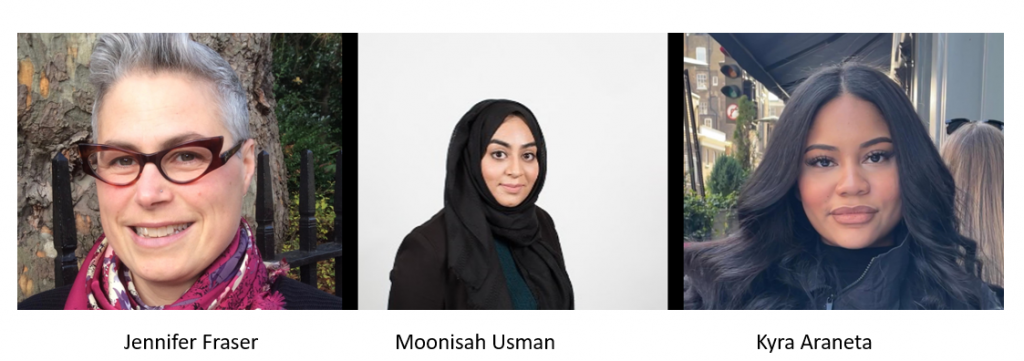
We are pleased to announce this year’s annual learning and teaching conference keynote (12-14 September 2022).
Kyra Araneta, Jennifer Fraser, and Moonisah Usman from the University of Westminster will be joining us virtually for their keynote speech, Navigating power lines: Developing principles and practices to support socially just student : staff partnerships.
In this keynote Kyra, Jennifer, and Moonisah will be discussing their successful staff-student partnership projects.
Session Abstract
For many of us universities and classrooms are sites of possibility (hooks, 1994) that we invest with hopes for different futures for students and ourselves. They are also sites of tension as we navigate complex relationships and power dynamics. How we live education for liberation has become even more pressing in recent years with mobilisations for Black Lives Matter and calls to decolonise universities. In Power Lines: On the Subject of Feminist Alliances Aimee Carrillo Rowe asks ‘How do we build power lines that connect us to others in, through, and for justice?’ (2008, p. 2). Our keynote engages with this question to explore how we develop principles and practices to support socially just student : staff partnership relationships. We argue that, if designed for social justice, partnerships can create anti-racist and decolonial atmospheres (Bell, 2018) that become sites of possibility. Using examples from our work at the University of Westminster we engage with the intersections of power, allyship, social justice and partnership to consider strategies for building programmes that centre transformative relationships. We share examples of how we have built relationships, co-created programme values and enacted these in partnership projects. To illustrate how we can build partnerships with power lines that connect us for social justice we will use the example of the Pedagogies for Social Justice Project (https://blog.westminster.ac.uk/psj/). This project is committed to centring student voices in its values, beliefs and experiences and in using these to dismantle contemporary forms of coloniality in curricula, relationships and research. We argue that partnerships are pivotal to this work as they co-produce knowledge; develop new and critical ways of understanding disciplines; and undertake sustained collaboration, experimentation and dialogue. Understanding that these are challenging and complex processes, we offer this keynote as a step in your University’s and your own journeys toward creating socially just pedagogical spaces for students and staff.
References:
Bell, Deanne. (2018). A pedagogical response to decoloniality: Decolonial atmospheres and rising subjectivity. American journal of community psychology, 62 (3-4), 250-260.
Carrillo Rowe, Aimee. (2008). Power Lines: On the Subject of Feminist Alliances. Duke University Press: Durham, NC.
hooks, bell. 1994. Teaching to Transgress: Education as the Practice of Freedom. Routledge: New York.
Speaker Bios
Kyra Araneta:
Having recently completed her undergraduate degree in Sociology at the University of Westminster, Kyra has continued her studies for a Master’s in International Relations. As a woman of mixed African-Asian descent, identity work has been a complex task for Kyra, but nevertheless a process that has inspired her efforts towards creating decolonial and anti-racist tools and spaces in the academy. In her next few years in education, she hopes that her work on the Pedagogies for Social Justice project can help to transform the ways we think about and engage with pedagogy on the higher education level.
Jennifer Fraser:
A non-binary queer academic at the University of Westminster, Jennifer has spent the past 20 years in the UK teaching and researching at the intersections of literature, gender studies, queer theory and critical pedagogies. Their approaches to education are also shaped by experiences as a white settler migrant in Canada and by growing up between different linguistic and geographic spaces of ‘home’. These both/and experiences of identity formation have taught them to centre building relationships and sharing stories to develop collaborative critical analyses. Formally, Jennifer is Principal Lecturer in the School of Social Sciences and University Director of Student Partnership in the Centre for Education and Teaching Innovation. What Jennifer loves most about these roles is how they bring them into contact with other dreamers and co-conspirators for change.
Moonisah Usman:
Moonisah is a hijab-practising Muslim woman, an academic and a new mother with a PhD in Biomedical Sciences. Raised as a Pakistani in London, Moonisah was challenged by expectations to achieve and the barriers to doing so. The pressures of getting an education, enhanced by being a first-generation student, inspired her choice to become a university lecturer for the Foundation programme in the Centre for Education and Teaching Innovation, University of Westminster. Here she leads a core university-wide module in critical thinking skills and also contributes to teaching academic skills, human physiology and medical genetics. Moonisah has a disciplinary research background in Urban Health. Simultaneously, Moonisah has a commitment to pedagogical research and promoting a culture of student partnership in higher education. She has found student partnership as a window to form genuine relationships with students and action compassionate and socially-just learning and teaching. More specifically, her research in this area is about developing meaningful partnership relationships to support racially minoritized students and address awarding gaps. You can connect with Moonisah via Twitter @Moonisah_wmin.

Conference bookings now open
A reminder that booking for the conference is now open and will be taking place with a mixture of online and in-person events 12-14 September.
Keep an eye on our website and blog for further updates.
